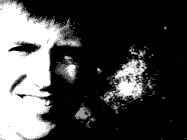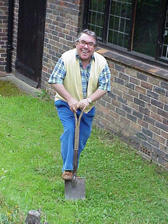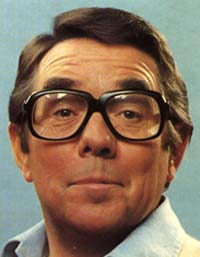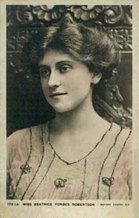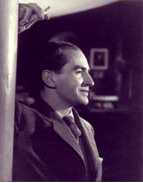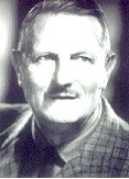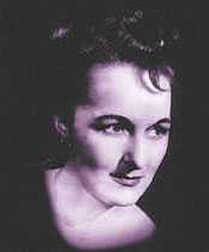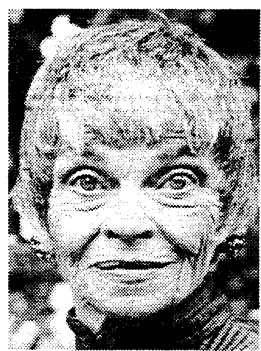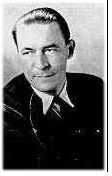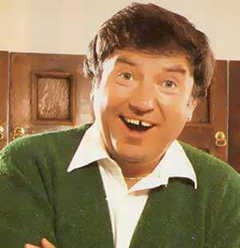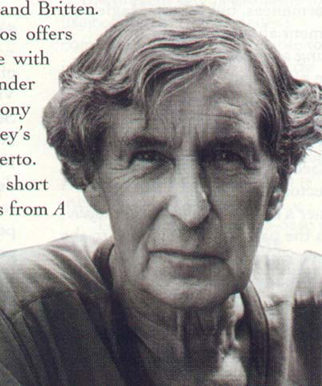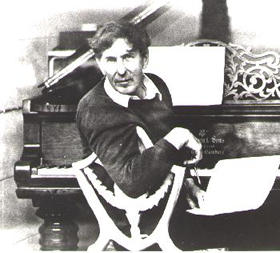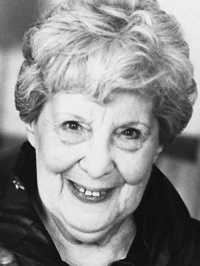
The
Barn Theatre,
25 Bluehouse Lane, Oxted, Surrey
RH8 0AA.
Tel:
01959 561811
Email: barntheatre
@btinternet.com

Past
Performers
Roy Castle
Ronnie Corbett
Beatrice Forbes-Robertson
Christopher
Fry
Tyrone Guthrie
Eileen Joyce
Mary Morris
Flora Robson
Cyril Smith
Jimmy Tarbuck
Michael Tippett
Anna Wing
Roy Castle was born on 31 August, 1932, in the village of Scholes, near Holmfirth, Yorkshire, UK. He got his first taste of the music business when, at the age of six, he took up piano lessons and later began learning to tap-dance. Roy's stage debut was as the cat in a production of Dick Whittington. From there, he joined the Jimmy James Comedy Act as James' stooge along with Eli Wood, but his big break came with his first television appearance on The Dickie Valentine Saturday Spectacular.
Make 'em Laugh
In a career which spanned over 35 years, he proved himself to be the very definition of versatility: He appeared in many major musicals on Broadway and London's West End - most notably in the revival of Singin' in the Rain and the Dickens adaptation Pickwick, alongside ex-Goon Harry Secombe - as well as five Royal Command performances; he had his own variety TV show in the mid -1960s and he acted in many films, the best known of which are probably Dr Terror's House of Horrors, Dr Who and the Daleks, the big-screen adaptation of the popular sci-fi TV series (which also starred Peter Cushing1) and Carry On Up The Khyber (one of the long-running, bawdy Carry On... series of comedies). Speaking about his Carry On… appearance, Roy once said:
My favourite moment of Carry On Up the Khyber was the famous eating scene. We all had to continue eating and chatting completely oblivious of the explosions going on all around us... As the place slowly disintegrated and debris fell into our food, we pushed it around our plates and tried to avoid actually 'eating' any. The scene continued for what seemed an eternity, and this being a filming technique where the actors never actually played to the camera, no- one had noticed the crew's practical joke. We carried on pushing the food around which now included Fuller's earth powder (not harmful but equally not appetising). Eventually we had to put some of the revolting concoction in our mouths. This made our serene acting even more difficult. Finally, Sid James broke the silence by emitting one word - 'Bastards!'. The director had given the cameramen and crew the wink. They had stopped the cameras but no-one had said 'Cut'. They all quietly sneaked away and left us to it!Roy also enjoyed a successful recording career, featuring on the soundtrack albums of many of the musicals he worked on. In 1960, he even scored a top 40 hit in the British singles charts with a song called 'Little White Berry'. In 1994, he released Ben and Roy Castle's Big Celebration, an album of music alongside his son, Ben.
In 1973, Roy starred alongside Ronnie Barker in 'Another Fine Mess', an episode of Barker's Seven of One, a series of one-off plays2. In it, Roy and Ronnie played two Laurel and Hardy impersonators - Roy was a lifelong fan of the comic duo and had, over the years, perfected a startling impression of Stan Laurel.
Record Breaker
It is as a presenter of the BBC TV programme Record Breakers (with his self-penned signature tune 'Dedication's What You Need'3) that Roy is best remembered. During his 22 series on the show, Roy gained no less than eight listings in the Guinness Book of Records, including the world records for the fastest tap-dancer (1,440 Taps Per Minute, 24 beats per second), playing one tune on 43 different instruments in four minutes and a 3-hour 23 minute wing-walk. It was with the typical optimism that he was renowned for that, in 1992, he announced one final 'record' he intended to break - surviving cancer.The Last Walk
Roy Castle was diagnosed with lung cancer despite being a lifelong non-smoker (it's believed he was a victim of what has become known as 'passive smoking' due to his time working in smokey clubs). Nevertheless, he amazed all with his enthusiastic, positive attitude to his predicament, drawing on his devout faith in Christianity and his determination not to let his final years go to waste. He became the figurehead for the Cause for Hope Lung Cancer Appeal (later renamed the Roy Castle Lung Cancer Foundation) and spent his last months raising money for the future development of the world's first 'International Centre for Lung Cancer Research'4 on his 'Tour of Hope', a massive 1200-mile walk around the UK. Despite warnings from his surgeon, Roy used every last vestige of energy to promote the cause, knowing full well that his time was short. He told reporters at the time:
My ambition was always that, when I came to my last days, I wanted to be able to look behind me and smile.During this time, he also completed his autobiography, Now and Then, which was a candid account of his life, including his long and varied career as well as his own reaction to the news of his illness.
Roy Castle finally lost his battle with cancer on 2 September, 1994, two days after his 62nd birthday. He was survived by his wife of over 30 years, Fiona, and his four children. His son Ben has followed in his father's footsteps, becoming a noted jazz musician.
Among the many tributes that followed, Roy's name was given to a train, the 47786 'Roy Castle OBE' . His name has also been used for a 'Clean Air' award given to pubs, restaurants and other public areas that refuse to allow smoking on their premises.
Ronnie Corbett - patron of Barn 2000
Short of stature and, during the 1970s, sporting thick-lensed glasses, British funnyman Ronnie Corbet spent 16 years as half of one of his country's most popular comic acts, the Two Ronnies. He has also had success on his own, as a comedian, a television personality, and an actor.
Corbett was discovered as a young man by interviewer David Frost in the 1960s. Recognizing him for a talented comic, Frost booked Corbett on his television show many times.
Corbett teamed with the much larger Ronnie Barker in the early '70s, and their television variety show debuted in 1971. The two could not be described as a comedy team in the normal sense, rather than working as a complementary pair of opposites like Abbott and Costello or Laurel and Hardy, the two were total opposites and often worked independently; somehow, their unlikely combination worked and their show ran through 1986. During the run of their hour-long show, several videotape retrospectives were released. The Two Ronnies continue to perform together, but Corbett has also successfully worked on his own on television, stage, and in feature films. He made his movie debut with a small role (opposite fellow neophyte Anthony Newly) in the comedy Top of the Form (1953). Corbett next appeared in Casino Royale (1967). Corbett's other film credits include Fierce Creatures (1997). ~ Sandra Brennan, All Movie Guide.
As can be seen from the photograph below, Ronnie Corbett supported the Barn 2000 project by initiating the building of the extension. He also encouraged patrons to give generously to the bucket collection at the end of each performance.

1883 - 1967
Beatrice Forbes-Robertson the ardent feminist who wrote 'What Women Want' appeared at the Barn to talk to the debating society in the early 1930's.
Christopher Fry
Born in 1907, he was one of the most celebrated playwrights of the mid-20th century, regarded as the Shakespeare of his time for his poetry and wit. While a young teacher, he helped to found the Tunbridge Wells Repertory Players in 1932 and directed the English premiere there of Bernard Shaw's Village Wooing in 1934.
Two years later, Fry married Phyllis Hart, a journalist who had recently returned from Canada where she worked for the Calgary Herald. In 1939 Fry left teaching to become the artistic director of the Oxford Playhouse, and in the same year published his first play, The Boy with a Cart. But his theatrical career was abruptly overtaken by World War II. A Quaker and a pacifist, Fry served four years with the Pioneer Corps fighting fires and dealing with bomb damage on the Liverpool docks.
After the war, his hopeful comedies led a resurgence in verse drama in English, especially the four "seasonal comedies": The Lady's Not for Burning ("Spring," 1948), Venus Observed ("Autumn," 1949), The Dark Is Light Enough ("Winter," 1954) and A Yard of Sun ("Summer," 1970). He also wrote religious dramas in verse such as The Firstborn (1946), Thor with Angels (1948) and A Sleep of Prisoners (1951), and several important dramatic translations such as Ring Round the Moon (1950) and The Lark (1955) by Jean Anouilh and Tiger at the Gates (1955) by Jean Giraudoux. Fry's plays attracted some of the era's best classical actors, including Paul Scofield in A Phoenix Too Frequent (1946), John Gielgud in The Lady's Not for Burning and Laurence Olivier in Venus Observed.
Christopher Fry still lives in Chichester, West Sussex, in England. In a letter to us in February, he wrote, "I wish indeed that I could be with you as you so generously invite me to be, but there's something about being a nonagenarian which dissuades from long travel and (particularly) airports. There is a lesson to be learned from GBS standing on a ladder to prune roses."
1900-1971
Sir Tyrone Guthrie was one of the foremost theatre directors of the 20th Century. He directed for the Scottish National Players, the Shakespeare Memorial Theatre, the Old Vic, Sadler's Wells, the Royal Opera House at Covent Garden, the Metropolitan Opera in New York, the Habimah Theatre of Tel Aviv, the Abbey and the Gate in Dublin, the Group Theatre of Belfast and many others. He founded the Shakespeare Festival Theatre at Stratford, Ontario, and The Guthrie Theatre in Minneapolis, Minnesota is named in his honour.He appeared at the Barn Theatre in 'The Triumph of Death' in 1924 together with Flora Robson, Robert Speaight and Cyril Bellamy.
Eileen Joyce was born in 1912 in Zeehan. She left Zeehan at the age of two for Kununoppin, W.A. Eileen first took piano lessons in about 1921 after moving to Boulder. She then studied piano at the Loretto Convent in Perth. After Eileen played for Percy Grainger and Wilhelm Backhaus they recommended that she study in Europe. With money raised by the local people she was able to go to Germany to study in about 1927 where she studied under Teichmuller at the "Conservertoire".
In 1930 she made her debut playing the Prokofiev concerto with Sir Henry Wood conducting the London Philharmonic Orchestra at a Promenade Concert in London. She became one of the BBC's most regular broadcasting artists, as well as being in demand for concert tours in the provinces. She memorised more than fifty piano concertos and numerous recital programs.
Eileen married in London in 1937 and had a son. Her husband died on active service in North Africa in 1942. During the war she performed regularly with Sir Malcolm Sargent and the London Philharmonic Orchestra, especially in blitzed areas.
She subsequently appeared with all principal UK orchestras as well as those of Berlin, France, Italy and New York. She made tours to Australia in both 1936 and 1948, South Africa in 1950, the Netherlands and Scandinavia in 1951, Finland and South America in 1952, New Zealand and Soviet Russia in 1958 and 1961 respectively, as well as Yugoslavia and India in 1962. Whilst in Tasmania she performed a solo at the gala opening concert of the Tasmanian Symphony Orchestra.
She was featured in films: Battle for Music, Girl in a Million, the allegedly biographical "Wherever She Goes" and contributed to soundtracks for Brief Encounter, the Seventh Veil and other films.
She was awarded an honorary Doctorate of Music from Cambridge University in 1971. She lived at Limpsfield in Surrey, England, and continued to take a great interest in young musicians from WA as well as in local musical endeavours.
She died on 25 March 1991.
Early in 1998 Mrs Mary Grant of England visited the West Coast Pioneers’ Memorial Museum “quite by chance” and observed the Eileen Joyce memorabilia held there. In subsequent conversation with staff member Jenny Gleeson, Mrs Grant mentioned that she was a member of the church where Eileen Joyce was buried and also that she knew of a light operatic society that had enjoyed Dr Joyce’s patronage during her lifetime.
Following Mrs Grant’s return home Jenny Gleeson received a letter from a Mrs Pat Rolph of Limpsfield, Surrey, England. Mrs. Rolph was chairman of the Oxted Operatic society of which Dr Joyce had been President for seventeen years and after Eileen Joyce’s death she was given some of the gowns worn by Dr Joyce at her later concerts. She was extremely interested to hear Mrs Grant’s account of her visit to Eileen Joyce’s birthplace in Zeehan and has donated, on behalf of the Oxted Operatic Society, one of these gowns to the West Coast Pioneers’ Memorial Museum.
WCHAL plans to create an interactive display celebrating Eileen Joyce’s life and achievements and Mrs Rolph’s gift of a gown is an invaluable acquisition.
References: The late I.W. (Bill) Wood, formerly of Zeehan, researched these biographical notes for the West Coast Heritage Authority Ltd, Newsletter (2) March 1999, West Coast Pioneers Memorial Museum
Biography: Davis, Richard, Eileen Joyce: a portrait, Fremantle, W.A.: Fremantle Arts Centre Press, 2001
Mary, one of the best dramatic actresses of her time was born at Suva in the Fiji Islands in 1915 and educated in Sussex and at R.A.D.A. She first appeared in London as Lysistrata at the Old Gate Theatre in Villiers Street and then came to Oxted to set up her own repertory company, The Stranger Players, who performed every week at the Barn Theatre from September 1936 to March 1939.
The Player's presented a wide range of productions from Shakespeare's 'Merchant of Venice', Tchekov's 'Uncle Vanya', Ibsen's 'When We Dead Awaken' through Oliver Goldsmith's 'She Stoops to Conquer', Shaw's 'Arms and the Man', various plays by Clemence Dane, a Christmas production of A.A. Milne's 'Toad of Toad Hall' (in which Mary Morris played the mole), 'And So To Bed', 'Love From a Stranger', Patrick Hamilton's 'Rope' and several of Noel Coward's plays including 'Hay Fever', 'Easy Virtue' and 'Tonight at 8.30'.
True to the best traditions of repertory, Mary played many parts including men's roles (Gratiano in 'The Merchant of Venice', Patrick Bramwell Bronte in Clemence Dane's 'Wild December'), usually designed the scenery and was sometimes assistant stage manager or wardrobe mistress too. She often danced or mimed before shows as well.
Later she went to Hollywood, returning to British films under Alexander Korda. She was cast opposite Leslie Howard in 'Pimpernel Smith' and Conrad Veidt in 'Thief of Baghdad'. Other films and many West End plays followed, including 'Peter Pan'. She went on to do much television work.
She died in Switzerland at the age of 72.
Flora Robson was born in Durham on March 28th 1902 and grew up in north London. After training at the Royal Academy of Dramatic Arts (RADA), she performed in London and Oxford in 1921-23. A shortage of employment then forced her to work in a factory until a friend recommended her to the Cambridge Festival Theatre in 1929. After two years there she returned to London and impressed audiences with her versatility. Her parts included the bloodthirsty Herodias in Salome, a drunken prostitute in Bridie's The Anatomist (both 1931), the snobbish Gwendolen in The Importance of Being Earnest, and Lady Macbeth (both 1933).
Among Robson's early films was Alexander Korda's Fire over England (1937), in which she played Queen Elizabeth I. She built on her success in this role during her brief Hollywood career (1939-42), when she played Elizabeth to Errol Flynn's Essex in The Sea Hawk (1941). On the New York stage she played the title role of Elizabeth the Queen (1942).
The most famous of Robson's subsequent stage roles was perhaps that of Paulina in Shakespeare's The Winter's Tale (1951). Her many achievements were acknowledged when she was made a DBE in 1960. Robson retired in 1969, a year after giving an inspired comic rendering of Miss Prism in The Importance of Being Earnest and died in 1984.
The Penguin Biographical Dictionary of Women, © Market House Books Ltd 1998
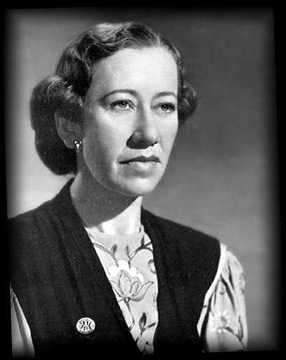
Cyril James Smith was born in Middlesbrough in 1909. He studied piano at the Royal College of Music and made his début in Birmingham in 1929. He played at the Henry Wood Promenade Concert in 1929 and at the Barn Theatre, Oxted during the 1930's. He had a distinguished career until 1956 when he lost the use of his left hand after having a stroke brought about by pressure problems in an aircraft on a visit to the USSR. He continued to perform in partnership with his wife Phyllis Sellick and several pieces for three hands were written for them. He became Professor of Pianoforte at the Royal College of Music in 1973 until he died in 1974 East Sheen.
The son of a bookmaker, Jimmy was born in Liverpool on 6th February 1940. He left school at 15 and started work as a garage mechanic but was sacked from this and many subsequent jobs for 'fooling around'. At 18, he joined a touring rock 'n' roll show which set him firmly on the showbusiness ladder of success, after which he became a Butlin's holiday camp Redcoat. It was at this time, when he was 22, that he was spotted by the late Val Parnell and made his TV debut on Comedy Bandbox. He made several guest appearances on Sunday Night at the London Palladium for Val Parnell until he became resident compere in September 1965.
He was soon headlining the top variety shows throughout the country as well as making his London cabaret debut at The Talk of the Town. Apart from appearing on Sunday Night at the London Palladium, his other hit series were The Jimmy Tarbuck Show for ATV, It's Tarbuck for ATV and Tarbuck's luck for the BBC.
At Christmas he could be found starring in pantomime and during the summer at leading English resorts. He also found time to visit Australia and Hong Kong to appear in cabaret and in 1975 he appeared in his own television game show Winner Takes All for Yorkshire Television. This ran until 1986 when it was followed by Tarby's Frame Game, also for Yorkshire Television.
In the late '70's, Jimmy started to appear as a guest on The Parkinson Show and these appearances were to cause a resurgence in his popularity as one of England's leading television comedians, but he still did not neglect his golf and was honoured to play in the Bob Hope Classic in America.
The '80's found Jimmy signing a five year contract with London Weekend Television to present Live from Her Majesty's which was aired in 1983/84 and 1985, followed by Live from the Piccadilly in 1986 and culminating with Live from the London Palladium in 1987/88. During this period he also had a television series called Tarby and Friends. This was a very successful talk show which was aired by London Weekend Television in 1984-1986 and followed by Tarby after Ten in 1988.
The '90's found Jimmy appearing in summer seasons, pantomime and yearly concert tours. He is regarded as one of England's leading after-dinner speakers and hosts many of the top award and business presentation shows as well as many TV guest appearances.
He has been honoured by an hour long special of This is Your Life and has found time to write Tarbuck on Golf which went to the top of the bestsellers and was followed by his second book Tarbuck on Showbiz which was equally successful.
He has received the top Variety Club of Great Britain award as Showbusiness Personality of the Year and for his charity work he has been made an Officer of the Most Venerable Order of the Hospital of St. John of Jerusalem.
He is recognised as one of Britain's top cabaret artists and after-dinner speakers and his love of golf has never wavered. He holds 'The Jimmy Tarbuck Golf Classic' annually in either Spain or Portugal and has been captain of Coombe Hill Golf Club. He regularly plays in charity golf matches throughout the country and is a life-long supporter of Liverpool Football Club.
In 1994 Jimmy was honoured by being made an OBE for his services to showbusiness and charity.
Sir Michael Tippett was born in London in 1905 and spent his childhood in Suffolk, making little contact with music until his teens. While at Stamford Grammar School, near Peterborough, he took piano lessons from a local teacher, Mrs Tinkler, sang in the local church choir and took part in amateur stage-productions. It was the experience of a hearing an orchestral concert in Leicester, conducted by Malcolm Sargent, that led him to decide to become a composer - even though he had little idea what it involved. His musical ambitions were not encouraged school, so he pressurised his parents into supporting him as a student at the Royal College of Music in London, where he enrolled in 1923.
While studying at the RCM, he took advantage of London concert life and the theatre scene to equip himself for his future career. After leaving the RCM in 1928, Tippett lived in Oxted, Surrey. Teaching French in a preparatory school and conducting a concert and operatic society, he earned just enough to enable him to spend long periods at composition.
In April 1930 an Oxted concert featured his main works to date; but these he afterwards withdrew. He then went for further lessons with R. O. Morris. These proved formative: he developed special skills in counterpoint which propelled him towards the first works of his creative maturity, his String Quartet No. 1 (1935; revised 1944) and Piano Sonata No. 1 (1936-7).
Both during his student days and after, Tippett responded deeply to world events - the First World War, the Depression and mass unemployment, children starving. He became involved in political radicalism, organised the South London Orchestra of Unemployed Musicians and directed two choirs sponsored by the Royal Arsenal Co-operative Society. At the same time his aesthetic ideas had crystallised in the course of several informal encounters with T. S. Eliot. The outcome of all this was the oratorio A Child of Our Time (1939-41), an impassioned protest against persecution and tyranny and now his most widely performed composition.
Tippett became musical director of Morley College in 1940 and remained there until 1951, giving it a new lease of musical life. The college became the focal point of the revival of Purcell's music; it also featured a lot of new music and upcoming artists like Alfred Deller, Peter Pears and the Amadeus Quartet, who were later to achieve worldwide fame. Meanwhile, in 1943, he was sentenced to three months' imprisonment for refusing, as a pacifist, to comply with conditions of exemption from active war service. He has remained committed to the pacifist cause.
After leaving Morley College, Tippett devoted himself almost entirely to composition, earning a small secondary income from radio talks. He completed his First Symphony in 1945 and then embarked on his first opera, The Midsummer Marriage; like his next three operas, it was first produced by the Royal Opera House, though they have all been presented abroad. They have exerted a considerable influence upon his subsequent symphonies, sonatas, concertos and quartets.
Tippett's international reputation blossomed from his sixties onwards, partly through a proliferation of recordings of his music. He is especially esteemed in America, and some of his most significant works (such as his Fourth Symphony and The Mask of Time) have been US commissions. Tippett has received many honours and awards; he was made a CBE in 1959, was knighted in 1966, became a Companion of Honour in 1979 and was awarded the Order of Merit in 1983; he is also one of the recipients of the Gold Medal of the Royal Philharmonic Society.
Throughout his eighties, Tippett remained exceptionally active, composing, conducting and travelling worldwide. His fifth opera, New Year, commissioned jointly by Houston Grand Opera, Glyndebourne and the BBC, received its premiere in 1989, was toured all over the UK the following year and the BBC screened their own television production in 1991. Immediately after the opera came Byzantium, for soprano and orchestra (premiered in Chicago in 1991 and repeated the same year at the Proms) and a Fifth String Quartet (1992).
Celebrations of Tippett's ninetieth birthday in 1995 opened with the BBC Music Magazine issuing a CD of Symphonies Nos. 2 and 4, played by the BBC Symphony Orchestra conducted by the composer. A month-long Tippett festival at the Barbican reached a climax with the world premiere of his last major composition, The Rose Lake, given by the London Symphony Orchestra under Sir Colin Davis. Subsequently, during a two-month tour of the USA and Canada, Tippett heard this greatly acclaimed work performed eleven times - in Boston (under Seiji Ozawa), Toronto (Andrew Davis) and Hartford (Michael Lankester).
Also in 1995, following upon his autobiography, Those Twentieth Century Blues (1991), there appeared his definitive collection of essays, Tippett on Music, and an idiosyncratic contribution to the Purcell tercentenary celebrations, Caliban's Song, part of a newly devised Tempest Suite commissioned by the BBC.
In 1996, Tippett moved from the isolated Wiltshire house in which he had lived for over 25 years to South London. That year saw the third production of his opera The Midsummer Marriage at the Royal Opera House, Covent Garden. In November the following year, the Stockholm Concert Hall mounted the largest retrospective ever of Tippett's concert music. Sadly, the composer fell ill with pneumonia just after arriving in Stockholm. Although he recovered sufficiently to be brought home, he died there peacefully on January 8, 1998.
Anna Wing
Flying High Many Years On
Winds seem to be blowing favourably these days for octogenarian actresses. Some, I hear, are getting more offers for dates than they feel they can comfortably manage. Anna Wing is not one of these - at 88, with a brisk mind and an optimistic outlook, she is always available for what her agent and friend Sheila McIntosh deems suitable.
She has just concluded a plum role as Mrs Grant in 'The Last Detective'. The week before she had been doing three jobs at the same time and was ready for more if needed. Today she blithely describes herself as a totally committed jobbing actress.
Wing has five blossoming grandchildren and two sons with distinguished academic qualifications. She lives alone in central London and she also has a flat in Brighton. Her big break came through a smart bit of casting when the BBC gave her the role of matriarch Lou Beale in 'EastEnders', a part she played for four years from 1984 to 1988.
At 11, with a firmness of resolve that characterised her adult life, Wing decided that she was going to be an actress. She had seen John Gielgud at the Old Vic and that convinced her that the only place for her was the stage. At 21 she found a place at drama school and soon made an appearance in 'Mary Rose' in Oxted. She then worked extensively in rep. Her professional CV lists 17 named appearances, 'The Last Detective' being the latest this year. As Miss Clarence in 'Blue Heart' at the Duke of York's, she toured the provinces and America. She played notable roles in 'Ladies in Retirement' and toured as Miss Holyrood in 'Bell, Book and Candle' and the formidable crackpot clairvoyant Madame Arcati in Noel Coward's 'Blithe Spirit'. Among her movies were 'Sweet William' and '101 Dalmatians'. She also figures in a list of top radio shows too numerous to mention.
When she arrived at the Croydon School of Acting attached to the Croydon Theatre for a one-year course, it so happened the leading man at the theatre was the handsome young Michael Barry. He saw her rehearsing and approved. Better, he remembered what he saw of Wing when he became head of the BBC drama department.
For her year at the Croydon School she had to thank an unknown benefactor. It enabled Anna to look after her parents and pay for her tuition. She went from Croydon straight to her professional start at the Barn Theatre, Oxted.
In 1939, a seasoned trouper, she flew to an island in Scapa Flow to visit a boyfriend, a sailor stationed there. On the way home war was declared on September 3rd and she ended up in prison. She had landed in Aberdeen which was completely blacked out and Wing did not know a soul. The police took her in charge and locked her in a station cell for her own safety.
Jobs in the theatre dried up completely. She took an instructional course at Middlesex Hospital as a nurse and volunteered for the Red Cross.
After the war it was back to rep. at Guildford and Amersham, where she met and married her first husband, a merchant navy lieutenant. There was another later but it was a disappointment for them both and they parted amicably. She devoted herself to her children and the theatre. They grew up and she never stopped working, keeping her zest for life undimmed in the theatre for 69 years and counting.
© The Stage, August 8, 2002
